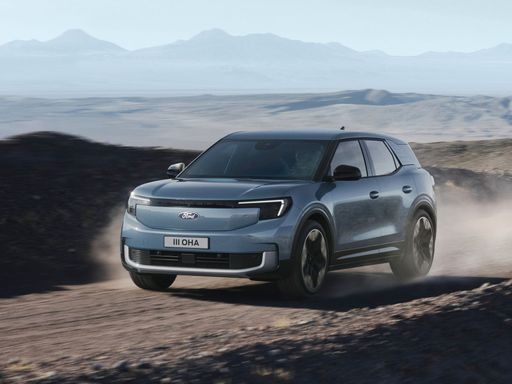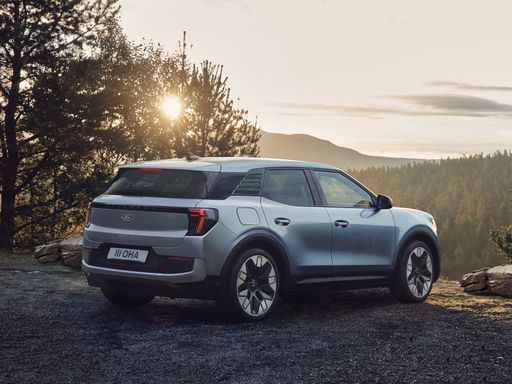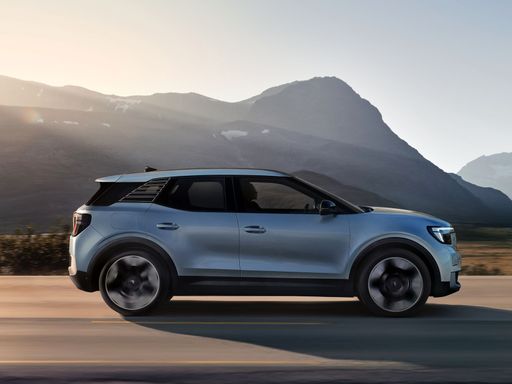Ford Explorer EV vs Toyota C-HR - Differences and prices compared
Compare performance (340 HP vs 223 HP), boot space and price (34200 £ vs 29100 £ ) at a glance. Find out which car is the better choice for you – Ford Explorer EV or Toyota C-HR?
Costs and Efficiency:
Price and efficiency are key factors when choosing a car – and this is often where the real differences emerge.
Toyota C-HR has a to a small extent advantage in terms of price – it starts at 29100 £ , while the Ford Explorer EV costs 34200 £ . That’s a price difference of around 5066 £.
As for electric range, the Ford Explorer EV performs decisively better – achieving up to 602 km, about 534 km more than the Toyota C-HR.
Engine and Performance:
Power, torque and acceleration are the classic benchmarks for car enthusiasts – and here, some clear differences start to show.
When it comes to engine power, the Ford Explorer EV has a noticeable edge – offering 340 HP compared to 223 HP. That’s roughly 117 HP more horsepower.
In acceleration from 0 to 100 km/h, the Ford Explorer EV is distinct quicker – completing the sprint in 5.30 s, while the Toyota C-HR takes 7.40 s. That’s about 2.10 s faster.
There’s no difference in top speed – both reach 180 km/h.
Space and Everyday Use:
Beyond pure performance, interior space and usability matter most in daily life. This is where you see which car is more practical and versatile.
Both vehicles offer seating for 5 people.
In curb weight, Toyota C-HR is noticeable lighter – 1505 kg compared to 1908 kg. The difference is around 403 kg.
In terms of boot space, the Ford Explorer EV offers hardly perceptible more room – 450 L compared to 447 L. That’s a difference of about 3 L.
In maximum load capacity, the Ford Explorer EV performs a bit better – up to 1422 L, which is about 267 L more than the Toyota C-HR.
When it comes to payload, Ford Explorer EV evident takes the win – 585 kg compared to 425 kg. That’s a difference of about 160 kg.
Who wins the race in the data check?
The Ford Explorer EV sits well ahead of its rival in the objective data comparison.
This result only shows which model scores more points on paper – not which of the two cars feels right for you.
Costs and Consumption
View detailed analysis
Engine and Performance
View detailed analysis
Dimensions and Body
View detailed analysis

Ford Explorer EV
Ford Explorer EV
The Ford Explorer EV translates the familiar big‑American SUV presence into whisper‑quiet electric motoring, offering roomy seating and a tech‑forward cabin that will please families and road‑trippers alike. It drives with more composure than its boxy looks suggest, blending a comfortable ride and eager acceleration while undercutting the guilt of gas stops — a practical, modern alternative for buyers who want Explorer space with electric charm.
details


Toyota C-HR
The Toyota C-HR cuts a striking figure with its angular styling and coupe-like profile, so you’ll never go unnoticed in the supermarket car park. It balances everyday practicality with a nimble, city-friendly personality, making routine commutes feel a touch more fun without asking for forgiveness.
details




Costs and Consumption |
|
|---|---|
|
Price
34200 - 48800 £
|
Price
29100 - 42800 £
|
|
Consumption L/100km
-
|
Consumption L/100km
0.8 - 5.1 L
|
|
Consumption kWh/100km
14.5 - 17.2 kWh
|
Consumption kWh/100km
-
|
|
Electric Range
360 - 602 km
|
Electric Range
68 km
|
|
Battery Capacity
52 - 79 kWh
|
Battery Capacity
-
|
|
co2
0 g/km
|
co2
17 - 115 g/km
|
|
Fuel tank capacity
-
|
Fuel tank capacity
43 L
|
Dimensions and Body |
|
|---|---|
|
Body Type
SUV
|
Body Type
SUV
|
|
Seats
5
|
Seats
5
|
|
Doors
5
|
Doors
5
|
|
Curb weight
1908 - 2179 kg
|
Curb weight
1505 - 1755 kg
|
|
Trunk capacity
445 - 450 L
|
Trunk capacity
350 - 447 L
|
|
Length
4468 mm
|
Length
4362 mm
|
|
Width
1871 mm
|
Width
1832 mm
|
|
Height
1630 - 1639 mm
|
Height
1558 - 1564 mm
|
|
Max trunk capacity
1417 - 1422 L
|
Max trunk capacity
1076 - 1155 L
|
|
Payload
561 - 585 kg
|
Payload
375 - 425 kg
|
Engine and Performance |
|
|---|---|
|
Engine Type
Electric
|
Engine Type
Full Hybrid, Plugin Hybrid
|
|
Transmission
Automatic
|
Transmission
Automatic
|
|
Transmission Detail
Reduction Gearbox
|
Transmission Detail
CVT
|
|
Drive Type
Rear-Wheel Drive, All-Wheel Drive
|
Drive Type
Front-Wheel Drive, All-Wheel Drive
|
|
Power HP
170 - 340 HP
|
Power HP
140 - 223 HP
|
|
Acceleration 0-100km/h
5.3 - 8.7 s
|
Acceleration 0-100km/h
7.4 - 9.9 s
|
|
Max Speed
160 - 180 km/h
|
Max Speed
175 - 180 km/h
|
|
Torque
310 - 679 Nm
|
Torque
-
|
|
Number of Cylinders
-
|
Number of Cylinders
4
|
|
Power kW
125 - 250 kW
|
Power kW
103 - 164 kW
|
|
Engine capacity
-
|
Engine capacity
1798 - 1987 cm3
|
General |
|
|---|---|
|
Model Year
2024 - 2025
|
Model Year
2024 - 2025
|
|
CO2 Efficiency Class
A
|
CO2 Efficiency Class
C, B
|
|
Brand
Ford
|
Brand
Toyota
|
What drive types are available for the Ford Explorer EV?
The Ford Explorer EV is available as Rear-Wheel Drive or All-Wheel Drive.
